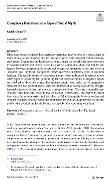Conspiracy Narratives as a Type of Social Myth

Datum vydání
2024Publikováno v
International Journal of Politics, Culture, and SocietyRočník / Číslo vydání
2024 (37)ISBN / ISSN
ISSN: 0891-4486ISBN / ISSN
eISSN: 1573-3416Informace o financování
UK/COOP/COOP
MSM/EF/EF16_019/0000734
Metadata
Zobrazit celý záznamKolekce
Tato publikace má vydavatelskou verzi s DOI 10.1007/s10767-023-09454-1
Abstrakt
It has long been recognized that conspiracy narratives may be seen as a special kind of myth. In most cases, however, this is taken as a sign of their irrational and unsubstantiated nature. I argue that mythical modes of reasoning are actually far more pervasive in modern political and cultural discourse than we commonly admit and that the difference between mainstream discourse and conspiracy narratives is not one between "rational" and "mythical" thought but rather one between different types of mythical thinking. The specific nature of conspiracy myths is best understood in relation to two other types of social myths: political myths and fictional myths. Conspiracy myths are a hybrid of these two genres: like fictional myths, they make use of imaginative elements, but like political myths, they are understood as having a relatively straightforward relation to reality and not just a metaphorical one. They are essentially anti-systemic, and their chief ethos is that of distrust. Nevertheless, the degree to which they reject the system varies, and it is thus useful to distinguish between weaker and stronger conspiracy myths. While the latter reject the system altogether and are incompatible with political myths, the former are capable of co-operating with them.
Klíčová slova
conspiracy theory, social myths, political myths, fictional myths, politics
Trvalý odkaz
https://hdl.handle.net/20.500.14178/2254Licence
Licence pro užití plného textu výsledku: Creative Commons Uveďte původ 4.0 International






